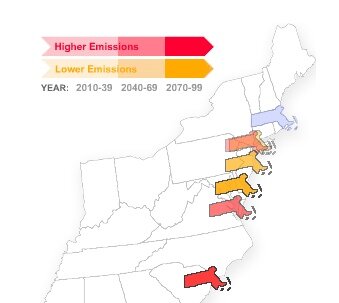 That title is an anagram of the phrase “ExxonMobil Corporation”. Today, the Union of Concerned Scientists released a remarkably detailed document that says:
That title is an anagram of the phrase “ExxonMobil Corporation”. Today, the Union of Concerned Scientists released a remarkably detailed document that says:
In an effort to deceive the public about the reality of global warming, ExxonMobil has underwritten the most sophisticated and most successful disinformation campaign since the tobacco industry misled the public about the scientific evidence linking smoking to lung cancer and heart disease.
I’ve been reading about this for a long time. Many authors have written about the disinformation campaign being waged by oil interests against global warming. In book Field Notes from a Catastrophe, she notes:
The United States is also the world’s chief purveyor of of the work of so-called global warming skeptics. The ideas of these skeptics are published in books with titles like The Satanic Gases and Global Warming and other Eco-Myths and then circulated on the web by groups like Tech Central Station, which is sponsored by, among others, ExxonMobil and General Motors.
The introduction to the report says:
ExxonMobil’s cynical strategy is built around the notion that public opinion can be easily manipulated because climate science is complex, because people tend not to notice where their information comes from, and because the effects of global warming are just beginning to become visible. But ExxonMobil may well have underestimated the public. The company’s strategy quickly unravels when people understand it for what it is: an active campaign of disinformation.
This is why I’m trying to be really transparent about the climate science built into Melting Point. I want to be sure that people know where my data and formulas come from, and why the science behind the game is believable. If people accept the science, then the game can help them come to conclusions about what our strategy should be.
I don’t know the answers. I’m hoping the game will help us find the answers together.
 I took this in Vermont over the holidays. Obviously, those aren’t real flowers. There was even a dusting of snow on the ground. But this is a place where I’m used to inches of snow at this time of year, if not feet of it, or at least enough ice to skate on. This year, mud was more of a problem than snow, and the local ski mountain only had about half its trails open.
I took this in Vermont over the holidays. Obviously, those aren’t real flowers. There was even a dusting of snow on the ground. But this is a place where I’m used to inches of snow at this time of year, if not feet of it, or at least enough ice to skate on. This year, mud was more of a problem than snow, and the local ski mountain only had about half its trails open. It’s been bouncing around news and the net this weekthat the Supreme Court will be hearing arguments in Massachusetts v. EPA today. This is an important case, but I’m not at all sure it’ll be resolved in any way that will actually prove useful in the fight against human-caused climate change.
It’s been bouncing around news and the net this weekthat the Supreme Court will be hearing arguments in Massachusetts v. EPA today. This is an important case, but I’m not at all sure it’ll be resolved in any way that will actually prove useful in the fight against human-caused climate change. When I gave , someone asked me if he could videotape it. I said yes. Well, he posted
When I gave , someone asked me if he could videotape it. I said yes. Well, he posted  He won pulitzer prize, wrote a book called The Heat is On, then another called Boiling Point. One of the top science books of 2004.
He won pulitzer prize, wrote a book called The Heat is On, then another called Boiling Point. One of the top science books of 2004. Just to avoid losing any more posts or parts of posts, I’ll keep them as separate entries.
Just to avoid losing any more posts or parts of posts, I’ll keep them as separate entries.